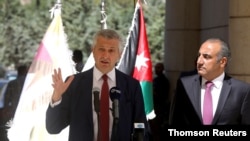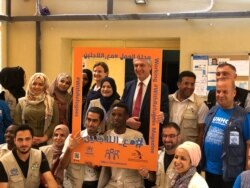U.N. refugee chief Filippo Grandi said Thursday that the forcible displacement of more than 70 million people worldwide was a "collective failure" of the international community and called for more global solidarity to resolve it.
"Most of the people that we are talking about, the 70 million, are fleeing from war, violence, crisis," Grandi told VOA in an interview in Amman, Jordan, where he marked World Refugee Day. "The international community seems to have lost its ability to address and resolve these wars and this crisis."
The U.N. refugee agency (UNHCR) said this week that 70.8 million people were either forced to flee their homelands last year or were displaced within their countries because of conflict, violence, human rights abuses or persecution. That's 2.3 million more than in 2017.
Some 25 million of them are classified as refugees under UNHCR's mandate. The rest are internally displaced or asylum seekers.
The majority come from just five countries: Syria, Afghanistan, South Sudan, Myanmar and Somalia.
But Grandi refuses to accept the idea that the problem is too big to fix.
"This is the danger. We are in a world in which we have a lot of unscrupulous politicians that are telling us exactly that: that it is impossible to stop this crisis of forced displacement," he said. "And you know what their solutions are? Push back, shut down, have restrictive legislation, build walls. That is a narrative that I don't accept."
He pointed to the U.N. Global Compact on Refugees agreed upon in December as a framework for more equitable sharing of responsibility and international cooperation. He said it was already improving refugee responses in at least 15 countries.
"It is possible to respond, but of course we need political will, we need resources. But we should never say it is impossible, because this leads to the end, the death, of international solidarity, and this would be really very, very grave," Grandi added.
The high commissioner spoke to VOA during a day of events to mark World Refugee Day. He met with Jordanian officials, NGOs and volunteers, and inaugurated a bazaar where refugees sold an array of handicrafts, food and art. On Friday, he will visit Azraq camp in northern Jordan, which houses more than 40,000 Syrians.
Changing negative attitudes
As some European countries and the United States have become more reluctant to accept refugees, Grandi said he was concerned that this "rejectionist attitude" was growing in prosperous countries.
"So my appeal is to the rich countries: Keep your doors open; continue to show hospitality for those that arrive there — they are a minority anyway — but in particular, continue to help countries like Jordan that are bearing the brunt of this big problem," he said.
And he urged people and governments to remember that real people are behind those big statistics.
"Unfortunately, it is necessary these days to remind the world that we are not talking about numbers, we are not taking about invaders, we are not talking about people taking advantage of something. We are talking about people in great distress, fleeing from danger, from risks, from persecution, from violence."






